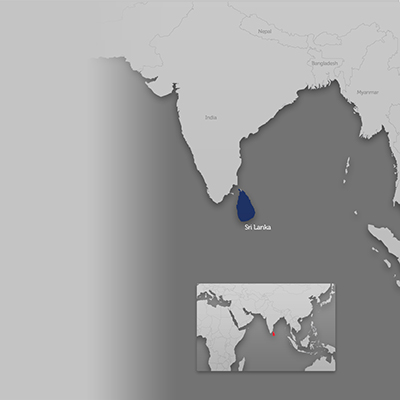
Sri Lanka
Project Overview
May 1, 2008
Michael Lear
 Our project reports could not have been prepared without the help of our Sri Lankan Project Team. Special thanks to Minerva Fernando, Nishantha Sandakelum, Dr. Chamal Sanjeewa, Ms. Dimuthi, Ms. Samanthi, Mr. Mahendra, Mr. Imthiyas and Professor Sujeewa.
Our project reports could not have been prepared without the help of our Sri Lankan Project Team. Special thanks to Minerva Fernando, Nishantha Sandakelum, Dr. Chamal Sanjeewa, Ms. Dimuthi, Ms. Samanthi, Mr. Mahendra, Mr. Imthiyas and Professor Sujeewa.
Over three years after the tsunami, Sri Lanka still faces many challenges on the road to socio-economic recovery. From heightened military activity in the north and east and increased attacks by rebel forces on civilians, to rising food and petrol costs, the challenges continue to silently take their toll. Resilient as they may be when adversity strikes, the Sri Lankan populace still needs the support of the international community to ensure it's future. The preservation of the cultural and agricultural diversity of Sri Lanka, which hallmark its charm, and the health and education of its rural poor and displaced communities are worth our continued assistance.
Real Medicine Foundation is now in it's third full year of participation in Sri Lanka. RMF continues to operate and support a free medical clinic in the Seenimodora Yayawatta Village for tsunami-displaced families, provide salaries for teachers at two pre-schools, one of which was built by RMF and is the only Muslim Tamil school of it's kind in the region and provides specialized training in progressive healing techniques for Physical Therapists at Navajeevana Rehabilitation Center. But perhaps the most surprising program of all is the Ruhuna Medical College Growth Hormone Project.




Due to many factors, RMF was considering a complete pull out of its operations. Changes in government policy related to NGO occupation, cost of living increases for employees, increased operating expenses related to economic shifts, gaps in administrative skills relative to western reporting conventions, inherent dysfunctions in the relationships between modernized western cultures and developing Asian cultures all played a role in this disposition.
While these factors represent valid consideration for an exodus, which most all other NGO's in Sri Lanka have exercised, it was important to reflect on what RMF's volition was in the first place and then weigh our responsibility for those who in part have become dependent upon our presence. Perhaps most important to reflect upon is that it was here that RMF was born; the original seed was planted. Therefore, would it not be prudent to look at the lessons being learned at this stage of our involvement before cutting off our "roots" so to speak.
Making the choice to support in times of emergency or disaster is obvious. The answer is always yes – circumstances are tragic and the suffering is palpable, even from a great distance. But what next after the dust settles, or in this case the water resides and the need is no longer urgent, at least in the eyes of those at a distance. These are the new questions and concerns for those affected who have been sustained by a potentially "temporary" source of abundance and the new challenges of Real Medicine in Sri Lanka.
The purpose of this trip was to audit each initiative and evaluate the feasibility of RMF to successfully maintain its current activities in Sri Lanka at desired levels of efficiency and effectiveness while meeting the growing demands of the communities involved. Through a series of staff meetings, record audits and project visitations, we were able to understand the shifting dynamics of our situation in Sri Lanka, resolve many of the issues that were affecting our progress and identify the needs for sustained growth for each initiative. A special thanks to the Real Medicine Staff in Sri Lanka for their support of this process and rising to the challenges these changes have presented.




A Final Note:
It was not long after arriving that it became immediately apparent as to why Real Medicine Foundation's success continued in the face of so many challenges; It was our investment in the people that carried the vision forward, beyond its original intention, and not just our investment in bricks and mortar such as schools and medical clinics. By selecting community leaders who recognize that the real solution is to empower the public to thrive on their own, RMF has been able to expand on its vision and actualize new opportunities.
Sincerely,
Michael Lear
RMF Country Director, Sri Lanka